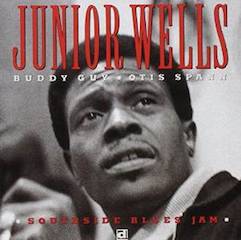
Junior Wells at Theresa’s Lounge (photo: C.C. Rider Blues.com)

SOUTHSIDE BLUES JAM
Junior Wells (with Buddy Guy, Otis Spann, Louis Myers)
Delmark
It was Junior Wells’s return to the Delmark fold; it was the titan Otis Spann’s last recording session. Junior’s regular band—Buddy Guy, guitarist Louis Myers, drummer Fred Below, bassist Earnest Johnson—filled Chicago’s Sound Studios with blues legends, all at the top of their games.
Finally on CD, this reissue of a free flowing 1970 session adds seven bonus tracks to the original vinyl’s eight and is remastered with bright, warm studio sonics. The singular conceit here was to recreate in the studio the Monday night improvisational cavorting commonplace at Theresa’s Blues Bar on the Windy City’s south side. The club’s namesake, Theresa Needham, looms large in Chicago blues history, if you take the word of Delmark founder Bob Koester for the truth it is. In the liner booklet here he praises Needham’s “massive contribution to the blues for paying decent wages to the artists that played her club and putting up with occasional lapses. She worked fourteen to sixteen hours a day. I remember one night, for some reason, I had bugged a patron. When we left, Theresa, Junior, Buddy and a bunch of others made sure we got to our car all right. I always felt secure in the south and west side clubs because the owners didn’t want anything to happen that might jeopardize their licenses. I felt even more secure at T’s.”
Junior Wells, featuring Buddy Guy, Otis Spann, Earnest Johnson and Louis Meyers, ‘Just Make Love to Me,’ from Southside Blues Jam
So this expanded edition of the vinyl version boasts no less than seven bonus tracks, for a total of 15. The real joy this brings is in hearing even more of these titans stretching out, challenging each other, having a whole lot of fun and laying down some serious grooves and vocals, beginning at the top with Spann’s rich, heavy chording kicking off “Stop Breaking Down” ahead of Junior entering with an emotional plea to a woman to lighten up on him. At 3:33 this is one of the album’s shorter tunes but it’s long enough for each player to establish himself, including some probing guitar injections from Mr. Guy; deep, moaning harp from Mr. Wells; and the solid bottom supplied by bassist Johnson and drummer Below. The story of the second cut, “I Could Have Had Religion” (wherein Junior blames a feckless lass for causing him to forsake the pulpit), is one of the deepest blues—the abject sorrow with which he infuses the title sentiment at the outset is chilling. Given Junior’s penchant for making up lyrics on the spot, he takes time to apprise listeners of Howlin’ Wolf’s heart attack, Magic Sam’s death and the current status of a certain famous Chicago bluesman’s condition, to wit, “Muddy Waters in the hospital/and he can’t even get around,” before getting back to the main theme. Muddy, in fact, is a very real presence on Southside Blues Jam without even being present. Fred Below, of course, was in Muddy’s band, but more to the point, his name pops up a couple more times in the improvised lyrics, and one of the session’s powerhouse tracks is a stomping, grinding treatment of Muddy’s (as penned by Willie Dixon) “Just Make Love to Me” in which Junior’s gospel shouts and moans, and stuttering repetitions, are shadowed by Buddy’s trebly, upper neck ruminations.
‘Trouble Don’t Last,’ Junior Wells, featuring Buddy Guy (lead vocal and guitar), Otis Spann, Earnest Johnson and Fred Below, from Southside Blues Jam
It only gets better: the searing “Lend Me Your Love” is a festering wound, a narrative ripped from a man who’s served time in the pen and subsequently been disowned by his mother and dumped by his woman. If Junior’s lowdown vocal didn’t sound so much like he had lived every excruciating moment of this tale, you’d know how close to the bone it cuts by the savagery of Guy’s piercing guitar solo and the sheer depth of loneliness Spann conjures in a solo unbearably heavy on mordant left-hand comping and resigned right-hand trills. Muddy’s “Long Distance Call” gets a boozy, late-night swing treatment fueled by Well’s lowdown harp and Spann’s ruminative piano commentary.
‘I Could Have Had Religion,’ one of the completely improvised tunes from Southside Jam. Junior Wells with Louis Myers (guitar), Otis Spann, Earnest Johnson, Fred Below
One of the most interesting cuts here or on any of Junior’s albums is the curious blend of autobiography mutating into social commentary in “Blues for Mayor Daley.” (Junior and Buddy were not strangers to social commentary: in 1966 they cut the potent “Vietcong Blues.”) Boss Richard J. Daley may be little more than a footnote in history to several generations that have grown up since he died in office in 1976, after serving as mayor for 23 controversial years. This is not the place to enumerate the pros and cons of Daley’s reign, so consider what the late, great singer-songwriter Steve Goodman once said of the Boss: “No man could inspire more love, more hate.” He was not much of a friend to the city’s black population, and this is where Junior and his buddies come in. Consider how Michael Cuscuna describes the track in his liner notes after pointing out that this song and “I Could Have Had Religion” are “completely improvised; they could not have happened any other way.”
Writes Cuscuna: “’Blues for Mayor Daley’ begins as an autobiography. Junior sings about his birth, his first exposure to the blues, his influences and what the blues means to him. When he begins to think of the brotherhood, the passion, the guts, the humanity and the love that are essential to the music and the atmosphere in which it is played, he sings about Mayor Daley. He wants to take Daley by the hand and bring to a Monday night jam to show him real life and love. He couldn’t explain it; he’d just have to make the mayor experience it. After this six-minute monologue, you not only have a very accurate idea of the power of the blues, but you have a very good notion about the particulars of Mayor Daley’s human deficiencies.”
‘Blues for Mayor Daley, ‘ Junior’s curious combination of autobiography and social commentary, from Southside Blues
Things really soar when the warm, ad-libbed verbal jousting on “Trouble Don’t Last” heats up. It’s 7:54 of volcanic simmering featuring sly references to Skip James and Sonny Boy Williamson amidst Guy’s stinging guitar and earthy vocal, Junior’s tremulous harp and dark voice and Otis Spann’s spot-on responsive fills on the 88s. And if you really want to hear Junior and company sounding completely like live human beings, free on the earth, dig their workout on Sonny Boy Williamson’s “In My Younger Days”—Junior is so into it he’s laughing at points, and the force of his vocal commitment is matched by the fury of his harp. In 1975 Junior didn’t settle for a studio recreation of a night at Theresa’s. Delmark released Live at Theresa’s 1975, a lively set of blues both scintillating and sizzling, replete with Junior’s amiable stage patter and some of the rawest blues ever captured on a live recording.
That Theresa’s was a one-of-a-kind nightspot is a point Junior and his buddies make with a vengeance on this recording and on its 1975 iteration (with an entirely different band, mind you).
Anyone remember The Twilight Zone episode, “A Stop at Willoughby”? Wherein a harried modern businessman falls asleep on the train home and awakens to find himself transported back in time, to a bucolic summer day of 1888 in a small, peaceful village called Willoughby? On his first trip he gazes at it in wonder from his seat; when he next awakens, he’s back in the big city’s hurly burly. He vows to get off next time, and so he does. There he finds the peace and contentment he was searching for. Except that when the scene fades, we find that the fellow had gone running off the moving train, and now lies dead in the snow. It was all in his mind. Well, yours truly does wish he could find his Willoughby, but it would do to be able to step through a wrinkle in time and wind up in Theresa’s on a Monday night back in the day. Get into Southside Blues Jam and you’ll wish you had been there too, where you could live life full measure. As they said on another memorable Twilight Zone episode, “Room for one more, honey.”
https://www.youtube.com/watch?v=HVtic8OQaHQ
A clip from The Twilight Zone, ‘A Stop at Willoughby,’ Rod Serling’s favorite show from the first TWZ season.



